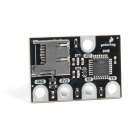SparkFun gator:bit v2 Hookup Guide
Contributors:
 LightningHawk,
LightningHawk,  Englandsaurus
Englandsaurus
Resources and Going Further
For more information, check out the resources below.
- SparkFun gator:bit v2
- gator:bit v2 GitHub Repository
- gator:bit v2 Schematic (PDF) - Schematic for the gator:bit.
- gator:bit v2 Eagle Files (ZIP) - Board design files for the gator:bit.
- Backup Copy of .hex Files for Examples
- microbit.org
- About micro:bit - Information about the micro:bit foundation.
- Hardware - Technical and compliance information.
- Getting Started - Getting started with the micro:bit.
- micro:bit Programming - List of programming environments for the micro:bit.
- Activities - Ideas from the micro:bit website.
- Projects - Projects that you can build with your micro:bit.
- Apps - The micro:bit apps let you send code to your micro:bit wirelessly using Bluetooth. No leads needed!
- Educator Teaching Resources - Resources for educators. Classroom oriented activities based on the micro:bit.
- Code Club Activities - 6 activities from Code Club to try out!
- BBC micro:bit - Kitronik University - More micro:bit tutorials.
- SparkFun micro:bit Landing Page
- SparkFun micro:bit Series - Video tutorials to get started using the micro:bit or using it with MicroPython.
Note: Looking for more components to to connect with your gator:bit? Check out the following gator accessories.
For additional SparkFun tutorials, check out some of these related micro:bit tutorials:
Getting Started with the micro:bit
The BBC micro:bit is a compact, powerful programming tool that requires no software installation. Read on to learn how to use it YOUR way!
SparkFun gator:particle Hookup Guide
The gator:particle is an I2C heart-rate monitor and pulse oximeter that can be used as a particle sensor. This tutorial will get you started using the gator:particle with the micro:bit platform.
SparkFun gator:microphone Hookup Guide
The gator:microphone is an I2C sensor for detecting sound with an electret microphone. This tutorial will get you started using the gator:microphone with the micro:bit platform.
How to Create a MakeCode Package for Micro:Bit
Learn how to develop code blocks for the Micro:bit in Microsoft MakeCode!
Try exploring micro:bit with cardboard circuits!
